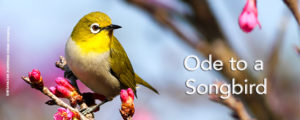I hit a bird today. A tiny, sparrow-like mama bird with a pale yellow body flying across the road with a morsel in her mouth. Too late I saw her; too late saw the morsel in her mouth; too late saw her hit the glass and fall to her death on the shoulder of the two-lane country road.
It ripped my heart out to hit her. Red-shouldered hawks have circled our skies for days, gathering meat for their nests, but she’d survived them. She understood the hawks and had probably outmaneuvered them more than once this spring. She’d withstood other predators, too: Squirrels, crows, possums, and coons all enjoy a songbird’s egg. But nothing in her DNA had prepared her to meet a windshield. She never saw death coming.
The little mother was on one of those missions that only another mother can understand; racing through each day, exhausting herself to find food for her young. Her flight path was lo and laser-focused on the first maple in the meadow where generations of mountain songbirds reared their young before her. The meadow was theirs long before the road was ours.
My mind leapt to the nest, to the young who were now without a mother. As I well understand, the death of a parent is a family affair, and I lifted a prayer that they will survive without her. In high contrast to our thoughts of immortality (despite our continued 100% morbidity), wild things live day to day and understand that death is never very far away.
For weeks now the songbirds have greeted me in the morning and their full throated singing has filled my heart with joy. They are such a reminder that new life is rising from the dark cold of winter, that what has been birthed in darkness will soon lift blooms above ground.
This sweet bird’s sudden death was another reminder to slow down and live more intentionally; to hold myself accountable for the precarious balance between humanity (the world’s most invasive and dangerous species) and the rest of nature. Her soft life was a reminder that we, too, face new threats to our survival: poisoned food and water, noxious air, global warming, the marriage of big food and big medicine. (Lord have mercy upon us.) We are all connected, you know. What kills the songbirds kills us, too. Let us remember (before it is too late!) that their songs, our songs, are too valuable to lose.

